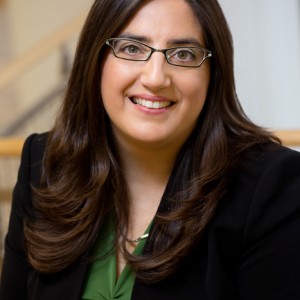Executive Committee
Six women from across political science subfields serve on the WomenAlsoKnowStuff (WAKS) Executive Committee. Their work supports the WAKS mission to promote the work of women for political science.
This includes expanding and maintaining the scholar database, publicizing women's research on social media, and developing and implementing related initiatives and opportunities that further the WAKS mission.
Learn more about each member of the WomenAlsoKnowStuff Executive Committee:
Regina Bateson - University of Ottawa

Regina Bateson (PhD, Yale University) is an assistant professor in the Graduate School of Public & International Affairs at the University of Ottawa. She studies international relations and comparative politics, with interests in human rights, conflict studies, the politics of crime, and the political consequences of violence. Her work is published in the American Political Science Review, Perspectives on Politics, Comparative Political Studies, Comparative Politics, the Journal of Peace Research. Selected honors include the 2013 Heinz I. Eulau Award, the 2014 Gabriel A. Almond Award, and an honorable mention for the 2019 Carrie Chapman Catt Prize for Research on Women and Politics. Prior to her academic career, Regina was a diplomat for the US Department of State. In 2017-2018, she ran for Congress in her home district in California. Learn more at www.reginabateson.com .
Sarah Bauerle Danzman - Indiana University at Bloomington

Sarah Bauerle Danzman, Ph.D., is an Associate Professor of International Studies at Indiana University Bloomington, faculty director of the Tobias Center for Innovation in International Development, a non-resident senior fellow at the Atlantic Council, and a Council on Foreign Relations Term Member. In 2019-2020, she was Council on Foreign Relations International Affairs Fellow, working in the U.S. Department of State as a Policy Advisor in the Office of Investment Affairs. Prof. Bauerle Danzman specializes in the political economy of international investment and finance. Bauerle Danzman's research explores how domestic and multinational firms influence and adapt to investment regulation, the nexus of national security and investment, and how rules governing capital shape global networks of ownership, production, and economic growth. She is the author of Merging Interests: When Domestic Firms Shape FDI Policy (Cambridge University Press, 2019) and many articles published in outlets including Foreign Affairs, International Studies Quarterly, Perspective on Politics, Review of International Organizations, Review of International Political Economy, and Business and Politics. She is also a sought after investment policy expert, having testified on such matters before the Senate Banking Committee and the SEC.
Cesi Cruz - University of British Columbia

Cesi Cruz is an assistant professor jointly appointed in the Vancouver School of Economics and the Department of Political Science at the University of British Columbia. She works on topics at the intersection of political science and economics, with a focus on how information and social networks affect electoral incentives and economic outcomes. Her research is based on fieldwork in Southeast Asia (particularly the Philippines and Cambodia), and combines social network analysis, surveys, and field experiments. Her work has been published in outlets such as the American Political Science Review, American Economic Review, American Journal of Political Science, Comparative Political Studies, and the Review of International Organizations. Her latest projects and working papers are available on her website: www.cesicruz.com.
Ashley Jardina - University of Virginia

Ashley Jardina (Ph.D., The University of Michigan) is a political scientist who studies how individuals’ racial attitudes and group identities influence their political preferences and behavior. Her book, White Identity Politics, was published by Cambridge University Press in 2019. Her research and commentary have been widely featured in outlets like The New York Times, The Washington Post, The Economist, Vox, 538, The New Yorker, The Atlantic, and more.
Gisela Sin - University of Illinois at Urbana-Champaign

Gisela Sin is Associate professor of Political Science at the University of Illinois. She studies political institutions with an emphasis on the strategic elements of separation of powers. Gisela is currently working on presidential veto politics, as well as political parties in Latin America. She is the author of Separation of Powers and Legislative Organization (Cambridge University Press, 2015), and the coauthor of Congreso, Presidencia y Justicia en Argentina (TEMAS, 1999). Her research has been published in the Journal of Politics, the Journal of Theoretical Politics, the Journal of Legislative Studies, Comparative Political Studies, the Journal of Law, Economics, and Organizations, Studies in American Political Development, the Journal of Politics in Latin America, Perpectives on Politics, and Public Choice. She has presented her work at universities throughout Latin America and Europe and has been a scholar in residence at the Universidad Católica de Chile, the Instituto Iberoamericano Universidad de Salamanca, the Institut Barcelona d'Estudis Internacionals, as well as a Fulbright Scholar in the United States. She holds a Ph.D. in political science from the University of Michigan and a B.A. from the Universidad del Salvador in Argentina.
Advisory Board |
||
| Emily Bacchus, University of Kentucky | Amber Boydstun, University of California Davis | Nadia E. Brown, Georgetown University |
| Kim Yi Dionne, UC Riverside | Andra Gillespie, Emory University |
Toni Haastrup, University of Manchester |
| Samara Klar, University of Arizona | Melissa Michelson, Menlo College | Stella Rouse, University of Maryland College Park |
| Layna Mosley, Princeton University | Malliga Och, Idaho State University | Christina Wolbrecht, University of Notre Dame |
| Kathleen Searles, Louisiana State University | Patricia Stapleton, RAND Corporation |
Contact
All questions about WomenAlsoKnowStuff can be sent to contact@womenalsoknowstuff.com
Funding
WomenAlsoKnowStuff has received funding from the Democracy Fund, the National Science Foundation, the American Political Science Association, the Midwest Political Science Association, the European Conference on Politics and Gender, the International Studies Association, and the Southern Political Science Association.